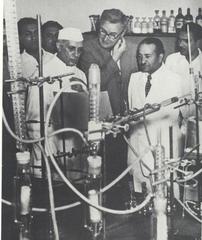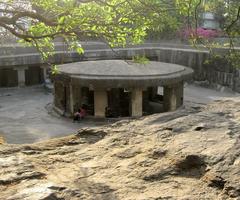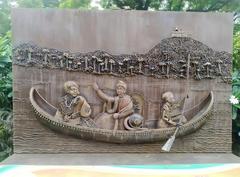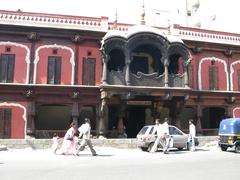
Inter-University Centre for Astronomy and Astrophysics (IUCAA), Pune, India: Visiting Hours, Tickets, and Visitor Information
Date: 03/07/2025
Introduction
The Inter-University Centre for Astronomy and Astrophysics (IUCAA) is a premier institution in Pune, India, dedicated to cutting-edge research, education, and public outreach in astronomy and astrophysics. Established in 1988 under the University Grants Commission (UGC), IUCAA was envisioned by eminent astrophysicists like Prof. Jayant V. Narlikar and Prof. Naresh Dadhich to serve as a national hub for research and academic collaboration among Indian universities. Its unique blend of world-class research, modern architecture, and robust science outreach makes it a significant destination for scholars, students, and the general public (Indpaedia; IUCAA Official).
This comprehensive guide details IUCAA’s historical evolution, research contributions, visitor experience—including hours, ticketing, and accessibility—and highlights its acclaimed public outreach activities. It also provides practical tips for visitors wishing to explore Pune’s rich cultural heritage alongside their scientific interests.
Table of Contents
- Introduction
- Historical Overview
- Research, Education, and Public Outreach
- Visiting IUCAA: Essential Information
- IUCAA Outreach and Signature Events
- Frequently Asked Questions (FAQ)
- Summary and Visitor Recommendations
- References and Further Reading
Historical Overview
Genesis and Founding Vision
IUCAA was established in the late 1980s as part of a national initiative to promote “centres of excellence” in scientific research. The vision, led by Prof. Jayant V. Narlikar and Prof. Naresh Dadhich, aimed to create a collaborative platform advancing research and education in cosmology and astrophysics. The foundation of IUCAA was also influenced by the Giant Metrewave Radio Telescope (GMRT) project, reflecting India’s growing ambitions in astronomical instrumentation and observation (Indpaedia; Wikipedia).
Campus Development and Architecture
Securing the IUCAA campus within the Savitribai Phule Pune University grounds was initially challenging, but persistent advocacy resulted in the allocation of a 10-acre site. The architectural design, crafted by Charles Correa between 1988 and 1992, is renowned for its cosmic symbolism—employing local stone, a central “Black Hole” courtyard, and spatial arrangements that evoke the expanding universe (Charles Correa Foundation).
Growth and Leadership
From modest beginnings in a single room, IUCAA rapidly evolved into a leading institution with modern laboratories and accommodation for visiting scholars. Prof. Jayant Narlikar served as founding director, succeeded by Profs. Naresh Dadhich, Ajit Kembhavi, and currently, Prof. Somak Raychaudhury (Wikipedia).
Research, Education, and Public Outreach
IUCAA is at the forefront of research in areas like cosmology, gravitational waves, radio astronomy, and space missions. It actively collaborates with national and international projects, including the Giant Metrewave Radio Telescope and LIGO-India. The Girawali Observatory, with its 2-meter telescope and IUCAA Faint Object Spectrograph & Camera (IFOSC), supports both research and student training.
Education and outreach are integral to IUCAA’s mission. The SciPOP initiative, National Science Day celebrations, and regular workshops bring astronomy closer to students, educators, and the public (scipop.iucaa.in; AXSX).
Visiting IUCAA: Essential Information
Visiting Hours and Access
- Weekdays: Monday to Friday, 9:00 AM – 5:30 PM
- Saturday Guided Visits: Every Saturday at 11:00 AM (by prior arrangement)
- Special Events: Additional access during events like National Science Day and 2nd Saturday programs
Entry and Registration
- Tickets: Entry is free for educational and study purposes; prior registration is required for all visits
- Booking: Arrange visits by contacting [email protected] or via the IUCAA Visitor Information page
- Group Visits: School and college groups (up to 40-50 participants) are welcome with advance notice
Accessibility
- Wheelchair Access: The campus features ramps and accessible pathways
- Assistance: Visitors with special needs should inform the outreach team in advance
Campus Facilities and Amenities
- Science Centre & Labs: Interactive exhibits and experiments for all ages
- Library: Extensive collection for guided academic tours
- Cafeteria: On-site dining for visitors and conference attendees
- Parking: Available but may be limited during large events
Travel and Nearby Attractions
- Location: Meghnad Saha Road, Ganeshkhind, within Savitribai Phule Pune University Campus, Pune 411007, India
- Transport: Easily accessible by city buses, taxis, and auto-rickshaws; parking available
- Nearby Sights: Explore Aga Khan Palace, Shaniwar Wada, Raja Dinkar Kelkar Museum, and the Pataleshwar Cave Temple
IUCAA Outreach and Signature Events
SciPOP (Scientific Public Outreach Programme)
A flagship initiative connecting over 80 universities, SciPOP organizes:
- Astronomy workshops and telescope-building sessions
- Guided campus tours and night sky observations
- Public lectures and science fairs (scipop.iucaa.in)
2nd Saturday Events
Open to the public every second Saturday, featuring:
- Guided tours
- Hands-on experiments and demonstrations
- Telescope sky observation sessions
National Science Day
Celebrated annually on February 28, including:
- Open labs and observatory access
- Special lectures and workshops
- Interactive exhibitions
Additional Programs
- Telescope-Making Workshops: Practical sessions for students and enthusiasts
- Friday Sky Sessions: Regular night sky observations and public lectures
Frequently Asked Questions (FAQ)
Q: Do I need to pay for tickets to visit IUCAA?
A: No, entry is free, but advance booking is required.
Q: What are the visiting hours?
A: Monday to Friday, 9:00 AM – 5:30 PM; guided visits are on Saturdays at 11:00 AM with prior arrangement.
Q: Is the campus accessible for differently-abled visitors?
A: Yes, the campus is wheelchair accessible. Inform the outreach team if assistance is needed.
Q: Are guided tours available?
A: Yes, as part of the 2nd Saturday events or by prior arrangement for groups.
Q: Can I visit IUCAA on weekends?
A: Regular visits are on weekdays; special events and Saturday guided tours are available with booking.
Q: Are children and school groups allowed?
A: Yes, with advance notice and adult supervision.
Q: Can I join public lectures or workshops?
A: Yes, these are regularly held and open to the public, subject to registration.
Summary and Visitor Recommendations
IUCAA, Pune, stands as a beacon of scientific inquiry, world-class architecture, and community engagement. Its contributions to Indian and global astronomy, through research and outreach, are complemented by a vibrant calendar of public events and educational opportunities. The campus, designed by Charles Correa, provides an inspiring environment for learning and exploration. Visitors are encouraged to plan ahead by registering for tours and events, and to enhance their experience by exploring Pune’s historical sites.
Whether you’re a researcher, student, educator, or curious traveler, IUCAA promises a memorable journey into the universe’s mysteries and India’s scientific legacy. For real-time updates and curated content, download the Audiala app and follow IUCAA’s official channels.
References and Further Reading
- Inter-University Centre for Astronomy and Astrophysics (IUCAA): History, Research, and Visitor Information in Pune, 2023, Indpaedia
- Inter-University Centre for Astronomy and Astrophysics, Wikipedia, 2023
- IUCAA Official Website, 2023
- Charles Correa Foundation: IUCAA Architecture, 2022
- Visiting IUCAA Pune: Hours, Tickets, and Exploring India’s Astronomy Hub, 2023, AXSX
- IUCAA Pune Visiting Hours, Tickets & Public Outreach Programs: A Guide to Astronomy Education and Events, 2023, SciPOP
- Leverage Edu: IUCAA Overview and Impact, 2023
For visual insights, refer to the IUCAA Slideshare for campus architecture and sculptures, and explore the IUCAA Visitor Information page for planning your visit.





